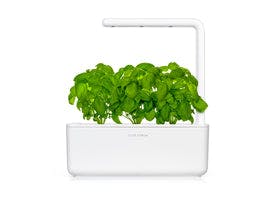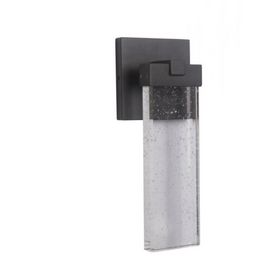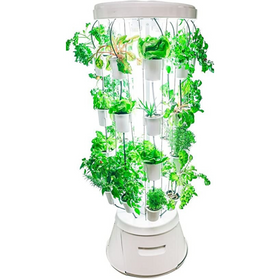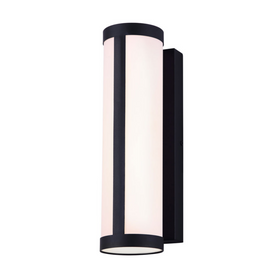
The Best Herbs and Plants to Boost Your Immune System
Last Updated: Mar 29, 2025Almost 2,500 years ago, the Greek physician Hippocrates reportedly said: "Let thy food be thy medicine and medicine be thy food." Despite tremendous advances in medicine and healthcare since that time, the prominence of that saying has perhaps never been more pertinent. With the COVID-19 pandemic impacting people worldwide, improving our diets with wholesome, immune-boosting foods and medicinal herbs is a strategy to add to our toolkits for healthy living. Of course, proper prevention strategies such as mask-wearing and social distancing continue to be the best way to avoid the coronavirus spread. One recent study concluded that "plant‐based foods play a vital role in enhancing the immunity of people to control of COVID‐19."
Today's article will look at how homeowners can grow their plant and herb-based "pharmacies" in their backyards, porches, or even on a windowsill. Many of the most potent, immune-boosting plants and herbs are easy to grow. They can play a significant role in boosting immune system health. We will explain its immune-boosting properties, some practical growing advice, and a few ideas for using it as part of a holistic health routine for each of the herbs and medicinal plants that we review below.
Table of Contents
- Why Grow Immune Boosting Herbs and Medicinal Plants?
- What Are the Best Immune Boosting Herbs for Home Gardens?
- Does Garlic Boost Your Immune System?
- Does Ginger and Turmeric Boost Your Immune System?
- Does Echinacea Boost Your Immune System?
- Does Elderberry Boost Your Immune System?

Why Grow Immune Boosting Herbs and Medicinal Plants?
Our global food system is dominated by industrial agriculture. Food manufacturing facilities make highly processed and refined foods that do not provide much nutritional value. The lack of a nutritious and wholesome diet has not only led to the drastic increase of chronic diseases such as heart disease, obesity, and diabetes - it also negatively affects our immune systems.
Taking vitamin C during flu season has long been a popular way to stay healthy. Adequate vitamin C consumption can help immune cells identify and kill viruses and bacteria. Instead of merely purchasing vitamin C capsules at your local pharmacy, however, incorporating different types of fruits, plants, and other medicinal herbs that are high in essential vitamins and minerals can help maintain a robust immune system throughout the year. According to the Harvard School of Public Health, "malnutrition or a diet lacking in one or more nutrients can impair the production and activity of immune cells and antibodies." In short, a healthy diet that focuses on wholesome nutrition can help to create a robust immune system.
Another good reason to grow your immune-boosting herbs and medicinal plants at home is to reduce dependence on antibiotics. Some health experts are already beginning to warn that antimicrobial resistance (AMR) might be the next major pandemic to sweep across the globe. Healthy immune systems can fight off many types of minor microbial infections without the need to prescribe antibiotics. A host of plants and herbs has natural antimicrobial functions that can help effectively fight off minor infections.

What Are the Best Immune Boosting Herbs for Home Gardens?
Unless you live in Florida, Arizona, or southern California, growing lemons, oranges, and other citrus fruits high in vitamin C will not be feasible. Fortunately, dozens of different types of plants and herbs contain large amounts of immune-boosting vitamins and minerals, and that can be grown in the colder climates of North America. The best immune-boosting plants that you should be able to grow in your home garden are garlic, ginger, turmeric, echinacea, and elderberry.

Does Garlic Boost Your Immune System?
In 1858, the famous microbiologist Louis Pasteur found that garlic could kill certain types of bacteria. Before antibiotics, garlic was used during epidemic outbreaks of cholera in 1913, typhoid fever and diphtheria in 1918, and even as a preventive remedy during the Spanish Flu pandemic of 1918.
Garlic has been shown to contain high allicin levels, a critical plant compound that acts as a germicide. One recent scholarly study found that garlic can "enhance the functioning of the immune system by stimulating certain cell types, such as macrophages, lymphocytes, natural killer (NK) cells, dendritic cells, and eosinophils, by mechanisms including modulation of cytokine secretion, immunoglobulin production, phagocytosis, and macrophage activation." In layman's terms, this essentially means that garlic can boost is not only a natural antibiotic but can also act as a preventive measure to colds, cases of flu, and other viral and bacterial infections by boosting your body's immune system response.
As an added plus, garlic is one of the easiest herbs to grow in North America. Native to Siberia, garlic is an excellent crop to withstand the freezing temperatures of winter. In most of North America, you can even plant garlic in the fall after harvesting the rest of your summer crops from your permaculture garden. Garlic bulbs are cold hearty enough to overwinter. In areas with mild winters, you may even see new growth throughout the winter. With a little bit of mulch and some natural, high-nitrogen fertilizer, you should be able to start harvesting garlic in July. In areas where garlic grows during the winter, harvest can occur even earlier.
To get the most medicinal benefits of garlic, consume it raw or lightly cooked. Overcooking garlic causes it to lose some of the potency of its antibacterial and immune-boosting effects.

Does Ginger and Turmeric Boost Your Immune System?
These two tropical or subtropical root plants have long been heralded in Ayurvedic medicine and cooking. Besides offering a unique flavor profile to any dish, they also are loaded with numerous health benefits.
The edible, bright yellow rhizome of the turmeric plant is one of the best natural anti-inflammatories you can find. Even professional hockey players have used turmeric to reduce inflammation that arises from their sport's physical nature. Because chronic inflammation is one of the root causes of several chronic diseases affecting today's population, turmeric supplements have never been more popular.
Research indicates that turmeric might also boost the immune system by exerting immunomodulatory effects on several cells and organs of the immune system.
Similarly, ginger can combat chronic inflammation while maintaining an immune system healthy. Studies suggest that ginger can enhance your immune response and act as a protective measure due to ginger's potent antiviral and antibacterial properties.
Because ginger and turmeric are native to tropical areas, they will die off when exposed to extended frosts or cold temperatures. Fortunately, ginger and turmeric are easy to grow in pots or other containers that you can move indoors during the winter. All you need to do is plant a fresh rhizome (or stem that grows underground) of turmeric or ginger in fertile topsoil. In ideal conditions, you should get your first harvest within 8 to 10 months. As a bonus, both ginger and turmeric offer beautiful tropical foliage that can help to regulate the humidity levels inside your home during the drier winter months. A sunny windowsill or an enclosed patio or sunroom are perfect areas to keep turmeric and ginger during the winter months.

Does Elderberry Boost Your Immune System?
Elderberry trees and shrubs grow wild in thickets, hedges, and forests in most areas around the country. This easy-to-establish tree is a favorite for birds and other wildlife. Fortunately for humans, the white flowers and dark-colored berries are another fantastic immune-boosting remedy. Both the berries and flowers of elderberry trees have high levels of antioxidants and vitamins that may boost your immune system. For hundreds of years, people have relied on homemade elderberry syrup to help prevent and ease cold and flu symptoms.
You can make elderberry syrup by simply mixing water, elderberries, ginger, cloves, and honey. Simmer this mixture for an hour in a large pan and mash occasionally to extract the medicinal elements from the elderberries. Once cooled, strain the thick syrup into glass mason jars and take a spoonful of this syrup once a day, especially during flu season.
Tobias Roberts
Tobias runs an agroecology farm and a natural building collective in the mountains of El Salvador. He specializes in earthen construction methods and uses permaculture design methods to integrate structures into the sustainability of the landscape.












